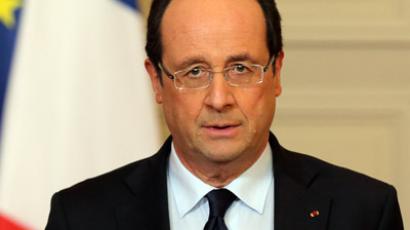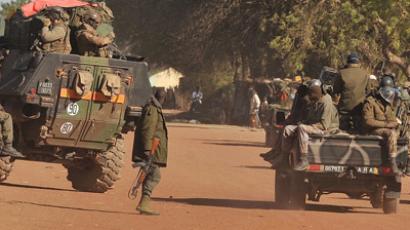UN declares humanitarian disaster in Mali as violence grip tightens
The UN plans to deploy about 6,000 peacekeepers in Mali to avoid ‘a catastrophic spiral of violence’. The international peacemaking organization has admitted a humanitarian disaster in the country.
The UN Security Council should reach an agreement in two or three weeks to ground the troops, according to Reuters citing an unnamed, senior UN official."As the situation evolves, attacks and reprisals risk driving Mali into a catastrophic spiral of violence," the UN High Commissioner for Human Rights Navi Pillay told the UN Security Council meeting on protecting civilians in conflict on Tuesday.She also called on all sides of the ongoing armed conflict in the West African nation to “abide by international human rights and humanitarian law, and to prevent retaliation”.The French invasion of Mali took a troubling turn, as Islamists started a campaign of guerrilla fighting using suicide attacks and landmines. Local journalist Gonzalo Wancha, who is in the thick of things in Mali, told RT that some of the key areas in this conflict are still off-limits to international journalists, with the French army “denying us passage saying it was for our own security”. The Islamists have been accused of brutal abuses during their 10 month-old rule over northern Mali, but Malian forces have also been accused of reprisal killings.“The insurgency in Mali is aggravated by ethnic clashes. An RT camera crew saw evidence of executions and brutalities perpetrated by the Malian army in Sevare. The military are not the only ones engaged in hunting down people of Arab or Tuareg origin, who are believed to be part of the insurgency. The locals are going after them as well, and for some time it has been difficult to find people from either of those ethnic groups anywhere in Mali. This brings us back to the fact that more than 330,000 people have been forced to flee from their homes because of the crisis,” Wancha told RT. Meanwhile Al-Qaeda in the Arabian Peninsula has reportedly called for jihad in Mali. The call to holy war from AQAP, the global network's Yemen-based branch, which was labeled by US officials as Al-Qaeda's most dangerous franchise, came as troops sought to tighten a security lock-down in Gao, which is the largest city in northern Mali and the target of a string of Islamist attacks."Supporting the Muslims in Mali is a duty for every capable Muslim with life and money, everyone according to their ability," AQAP's Sharia Committee said in a statement reported by a US-based site, which monitors extremist Internet forums.“The last straw for all those refugees, and indeed for all of Mali, has been a statement by Al Qaeda coming out of the Arabian Peninsula, which calls upon every Muslim to join the “holy war” against France – a war that is being fought in Mali, against the will of its people,” Wancha added.France’s military intervention of Mali against Islamist groups started four weeks ago, after the interim government asked for help against Islamist insurgents who had captured the north for 10 months and were advancing into southern territory.Paris sent in 4,000 troops backed by fighter jets and helicopters, racking up a string of early successes as the rebels were forced into desert and mountain hideouts by French and Malian forces in the north of the country.














